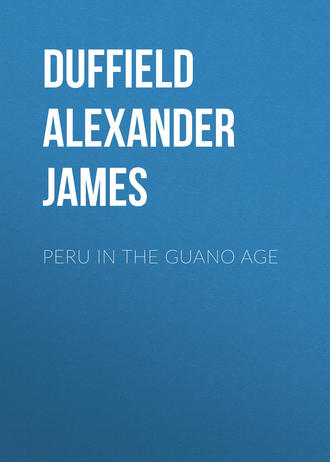 полная версия
полная версияPeru in the Guano Age
5
'Haber aparecido en el Peru el hombre que sin profanacion de la palabra se puede llamar el Mesias de los ferrocarriles para la salvacion de la Republica Peruana.' – El Ferrocarril de Arequipa, Historia, &c., Lima, 1871, p. lxxxi.
6
Written off Alta Villa, April 25, 1876.
7
For the biography of this estimable gentleman see 'El Ferrocarril de Arequipa Historia, documentada de su origen construcion é inauguracion.' – Lima, p. 96. 'Ese hombre era Enrique Meiggs, cuyo nombre va unido inseparable é imperecederamente á los trabajos mas colosales de las republicas del mar Pacifico.'
8
For these and similar ebullitions of profanity I am indebted to the Lima newspapers of the period, and one or two anonymous pamphlets.
9
Paz-Soldan.
10
With a liberality on a scale equal to all his achievements, Mr. Meiggs subscribed $50,000 for the sufferers in the terrible earthquake which desolated Arequipa and destroyed Arica in 1868.
11
It is difficult to be original in this age of metaphor. Only this morning, April 26, and quite by accident, I came on a little print which is published, I believe, in Callao, where I found the following:
'RAILROADS IN THE CLOUDS'Looking over our exchanges we found the following. It is from the New York Sun of January 16, and gives an account of Mr. John G. Meiggs being "interviewed" in that city.
'Mr. John Meiggs, brother of Henry Meiggs, the "King of Peru," as the millionaire contractor is called in South America, is lodging in the Clarendon Hotel. He is a tall, large man, past middle age, and with a clear penetrating hazel eye. He has an important share in the management of his brother's affairs. "Peru," he said, "is richer in the precious metals than any other country in the world. Our engineers in building the railroad from the coast to Puno have come across a hundred silver mines, any one of which might be profitably worked, if in the United States. If these mines are worked, the railroads we have built will be a blessing to the country."
'Reporter – "I understand that there are marvels of engineering on some of your railroads?"
'Mr. Meiggs – "Yes. One of our roads crosses the mountains at 16,000 feet above the level of the sea. Some of the bridges, too, are very lofty, and built with a skill that would do credit to any part of the world."
'Reporter – "Your brother is said to be worth several millions of dollars?"
'Mr. Meiggs – "Whatever he obtained in Peru he has fully earned, and whatever he owed there or elsewhere he has paid. He has not been a seeker of contracts. On the contrary, he has rejected contracts that the Government wished him to take."'
12
To which may be added $2,000,000 more for the conveyance of water along the line nearly from Arequipa to Mollendo.
13
Ferrocarril de Arequipa, pp. lxxxi-ii.
14
Estratocracia I find is the technical term by which Espinosa would designate the Government of Peru or a government by the military. This would seem to be true, seeing that since Peru became a Republic all its Presidents with only one exception have been Colonels, Generals, and Field Marshals.



